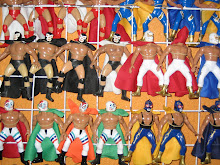 Defined as “strong or aggressive masculine pride,” machismo is mostly associated with unsavory or disrespectful male chauvinsm. Examples include cat calls and whistling to women, binge drinking, discrimination by gender, domestic violence against women, and rape, to name a few. Unfortunately, the locals in Cumaná can attest to the occurrence of these examples among men –though certainly not all– inVenezuela. Yet I have also observed a curious and seemingly benign exhibition within the microcosm of machismo Venezolana, an activity well suited to the seafood-laden food culture in this sweaty corner of the Caribbean: male-dominated soup parties. Known as sancocho de pescado, the hearty stew is one unexpected manifestation of machismo.
Defined as “strong or aggressive masculine pride,” machismo is mostly associated with unsavory or disrespectful male chauvinsm. Examples include cat calls and whistling to women, binge drinking, discrimination by gender, domestic violence against women, and rape, to name a few. Unfortunately, the locals in Cumaná can attest to the occurrence of these examples among men –though certainly not all– inVenezuela. Yet I have also observed a curious and seemingly benign exhibition within the microcosm of machismo Venezolana, an activity well suited to the seafood-laden food culture in this sweaty corner of the Caribbean: male-dominated soup parties. Known as sancocho de pescado, the hearty stew is one unexpected manifestation of machismo.Though many men claim to be all thumbs when it comes to cooking, they will jump at any opportunity to make sancocho. They take great pride in their ability to make a good soup, and
 the epitome of this phenomenon entails a six hour soup-making ordeal, during which men sit around a fire and drink shots of Cacique rum while they prepare and devour the sancocho. Then again, this is no ordinary fish soup, for its delicious flavor reflects local Caribbean and Andean ingredients. Most of the volume comes from a class of ingredients called the bituaya, consisting of yucca, pumpkin, a root vegetable called okumo blanco, and a small plantain called zumbi. The second component –and most flavorful– is called aliño, which consists of garlic, onion, and a small sweet pepper called aji dulce. Last but not least, the sancocho would be a fraud without the local catch of the day.
the epitome of this phenomenon entails a six hour soup-making ordeal, during which men sit around a fire and drink shots of Cacique rum while they prepare and devour the sancocho. Then again, this is no ordinary fish soup, for its delicious flavor reflects local Caribbean and Andean ingredients. Most of the volume comes from a class of ingredients called the bituaya, consisting of yucca, pumpkin, a root vegetable called okumo blanco, and a small plantain called zumbi. The second component –and most flavorful– is called aliño, which consists of garlic, onion, and a small sweet pepper called aji dulce. Last but not least, the sancocho would be a fraud without the local catch of the day.Despite the ferocious pride that some men express towards their sancocho, it is not exclusively male.
For example, my friend Ana –an English professor with whom I work– and her husband Jose Luís both make a delicious sancocho (I have tried the soups that each one makes). However, Jose Luís –and other men– express a more valiant attitude towards the sancocho. This could be explained by his heritage: he comes from a family of fisherman. It could be his connection to the catching of the fish itself: he always goes fishing when he visits his family on the weekends, bringing home the bounty for his soups. Or, he might be proud because sancocho is the only dish that he knows how to cook. Whatever the reason, he also makes a great teacher, which I realized last Thursday as he taught me the art of making soup. The meeting was part of the to-do list before my departure from Cumaná. To complement the occasion, Ana invited seven other English professors – and all of them women. Mostly Jose Luis and I were to be in the kitchen. Upon my entrance, Jose Luís handed me a beer and an apron. “We´re going to peel yucca,” he declared. At this announcement, Jose Luis passed me a knife, sat me down, and demonstrated the proper paring techniques for yucca and the other ingredients in the bituaya.
The whole process took about two hours before the sancocho had reached its point of perfection. At this point, large, deep bowls came out of the cupboard and were distributed to the (most female) guests full of soup. The pot was empty shortly thereafter. Watching the satisfaction of all, I felt confused because I had always considered machismo a bad thing. Yet I could deny neither my euphoria that accompanied my fervent, testosterone-drenched stupor, nor the guests´ praise towards the soup. This is a form of chavinism that I can appreciate: real men make fish soup.



